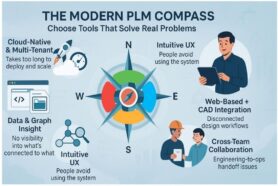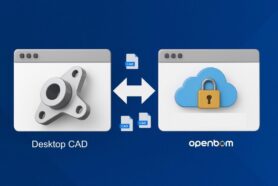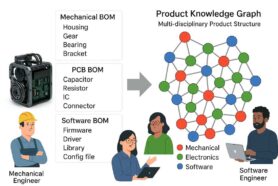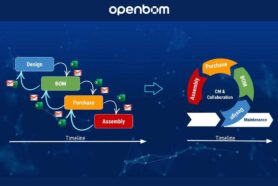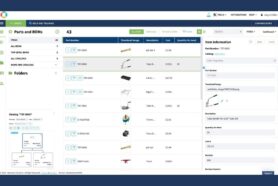
Manufacturing companies are always looking for ways to increase efficiency and optimize their daily operations. With the growing complexity of products, companies are struggling with the complexity of decision-making and related issues to access all needed information in a seamless way. The root cause of the problem is information stored in a variety of systems – most of them are well-established systems of record (SOR) – PDM, PLM, ERP, CRM, and many legacy applications, spreadsheets, old databases, and file systems. Such systems exist for years and companies are using them to manage static data. That’s why their called “system of records” – companies keep them to manage all information in an accurate way.
Collaboration, Transient Data, and Decision-Making Processes
The product development process is complex and usually spans access to multiple people, functions, and data point. It brings engineers working on multiple disciplines, managers, and sometimes even customers together. Such a process typically demands information to be available to evaluate a proposed solution (eg. product unit, change request, or even an entire product). The information that is needed during the process is hard to get and the complexity of processes goes beyond typical functions available in old systems or records. This is a moment when companies are taking the decisions into their hands and starting to pull data in a variety of Excel-like solutions. There are three reasons why companies do so:
- Create a flexible data management environment
- Get access to all pieces of information typically located in multiple systems
- To support collaborative activity combined with ubiquitous data analysis to support the decision-making process (eg. design change, supplier change impact, business change, etc.)
Once the decision is made, the outcome is returned into SORs. As part of the process, companies usually create some transient data to support their activity, store temporary data, and collaborate with people (inside and outside of the company, sometimes partners and customers).
Spreadsheets – the second best solution for everything?
What data management solutions can support such a complex decision-making process? What tools can companies use for that? The complexity of changes in SOR (systems of record) creates the situation when companies deliberately export data from SOR (eg. PDM, PLM, ERP, CRM) and use it for design, collaboration, and planning.
This process is quite complex but demands a high level of collaboration and seamless data management solutions. Think about any complex new product development (eg. medical device, industrial automation solution, vehicle, etc.) The foundation of this process is product-level BOM. The information in this BOM usually comes from multiple systems. BOM is going through the process of collaborative changes before coming into its final shape. The same can be said about the change management process that requires all needed information to be available to perform a comprehensive impact analysis. Another example is the enterprise costing process, which also requires the involvement of people from multiple departments and import information from multiple systems – ERP, CRM, and others.
OpenBOM Collaborative and Intelligent Web Services
At OpenBOM, we developed a flexible data management foundation that helps companies to import a large amount of information, connect these pieces of information together and provide access to this information in a seamless way to many people in a very easy way.
OpenBOM foundation is built using polyglot data management architecture using multiple databases. These databases provide support for flexible data modeling and a powerful system of relationships. OpenBOM is using NoSQL and Graph Databases to organize and manage information and relationships.
Part of the OpenBOM roadmap for 2023 is to provide a solution that can be used by manufacturing enterprises as an intelligent collaborative layer capable to collect information from multiple systems and use it for processes that require collaborative data management and analytic functions at the same time. The goal of the solution is to solve the pains involved in complex data management and to provide a platform for decision-making that can be used by companies during product development:
The foundation of these services will be OpenBOM enterprise data connectivity allowing for the collection, merging, and organizing of information from multiple SORs (CAD, PDM, PLM, ERP, CRM). OpenBOM semantic mapping layer will allow joining information coming from multiple silos. OpenBOM data management with patented BOM collaboration provides a platform for instant data sharing and changes.
Three new services will be provided as part of this solution.
- Impact analysis services – a graph navigation user experience capable to present information about a product, and relationships and identifying how products, people, and processes are connected to each other.
- Cost Intelligence services – a service to support flexible cost analysis data and cost rollup calculation based on the information extracted from multiple data sources (online and enterprise).
- BOM compare services – a service allowing the comparison of product data graphs from multiple BOMs, revisions, files, etc.
Looking for a development partnership
At OpenBOM, we believe in a true partnership in working with our best customers. For the past few years, we’ve built a solution based on strong relations with our customers. The complexity of data and processes is significant and we found many companies looking at how to build a collaborative application layer on top of existing SOR (system of records).
Conclusion
Web service is the next model of building online solutions easily available to customers using advanced data management architecture and modern user experience. At OpenBOM we believe in the combination of simplicity and powered flexible data management capabilities to organize multi-disciplinary data in a connected form to allow companies to take advantage of collaborative data management and information intelligence. OpenBOM is connected to all SOR in your company (CAD, PDM, PLM, ERP, and others) and allows seamless data extraction and data analytics. Interested to learn more, please contact oleg @ openbom dot com for more information.
REGISTER FOR FREE to check how OpenBOM can help you today.
Best, Oleg
Join our newsletter to receive a weekly portion of news, articles, and tips about OpenBOM and our community.


